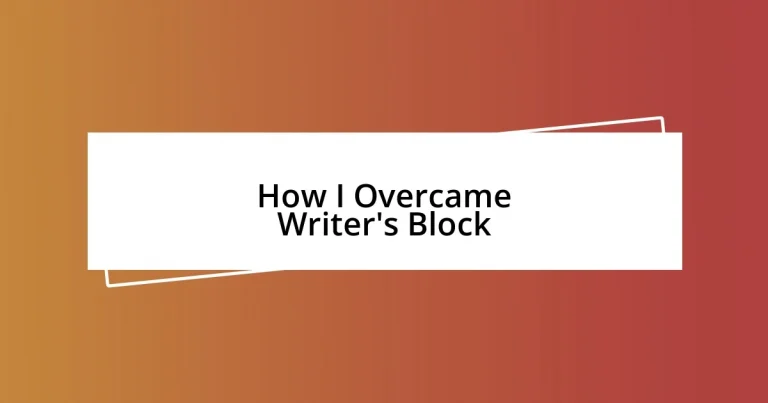Key takeaways:
- Identifying triggers of writer’s block, such as self-doubt, stress, and distractions, is crucial for overcoming creative barriers.
- Implementing practical techniques like timed writing sprints and changing environments can significantly enhance creativity and productivity.
- Seeking feedback, celebrating small writing wins, and maintaining a consistent yet flexible routine contribute to sustained motivation and growth as a writer.
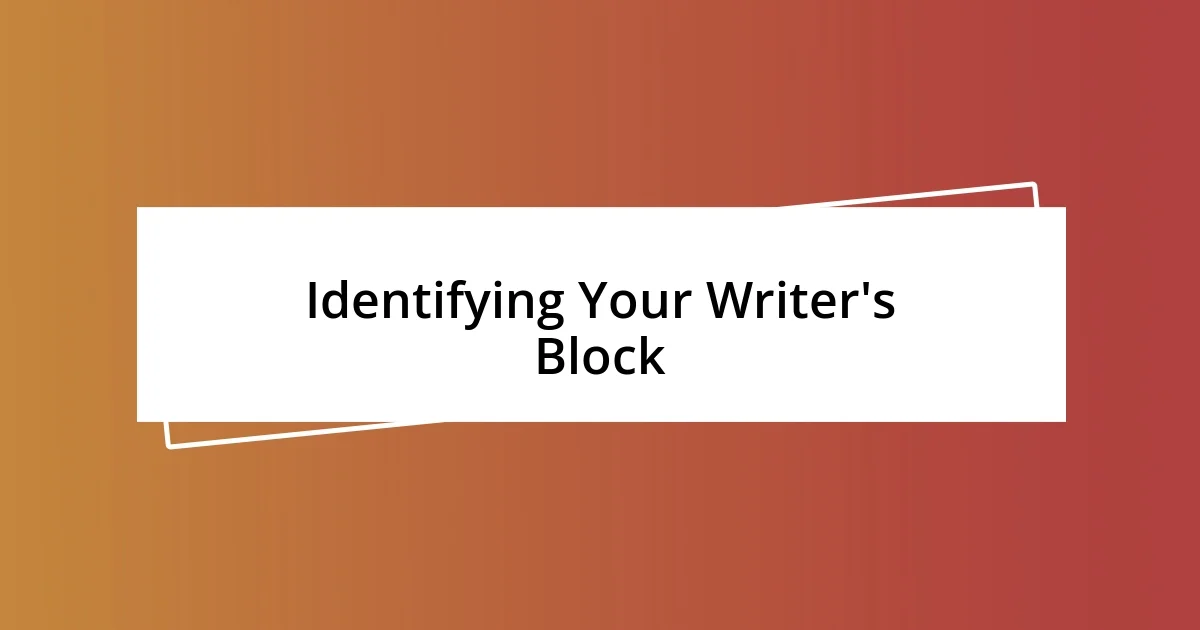
Identifying Your Writer’s Block
Identifying writer’s block can sometimes feel like trying to navigate through a fog. I remember sitting in front of my laptop, fingers poised above the keys, yet my mind was completely blank. It was as if an invisible wall had risen between my thoughts and the page, leaving me frustrated. Have you ever felt that disconnect between what you want to write and the inability to express it?
Often, writer’s block manifests in different ways. For me, it often starts with self-doubt—a nagging voice that questions whether my ideas are worth sharing. I wonder if you’ve experienced that same feeling, where every word seems inadequate. Recognizing these patterns is crucial; it’s about understanding what triggers your blockage.
Sometimes it can be external factors; stress from work or personal life weighs heavily and can stifle creativity. I once realized my block was linked to feeling overwhelmed with deadlines. Reflecting on these reasons helps illuminate the underlying issues. Have you considered what might be causing your own creative stagnation?
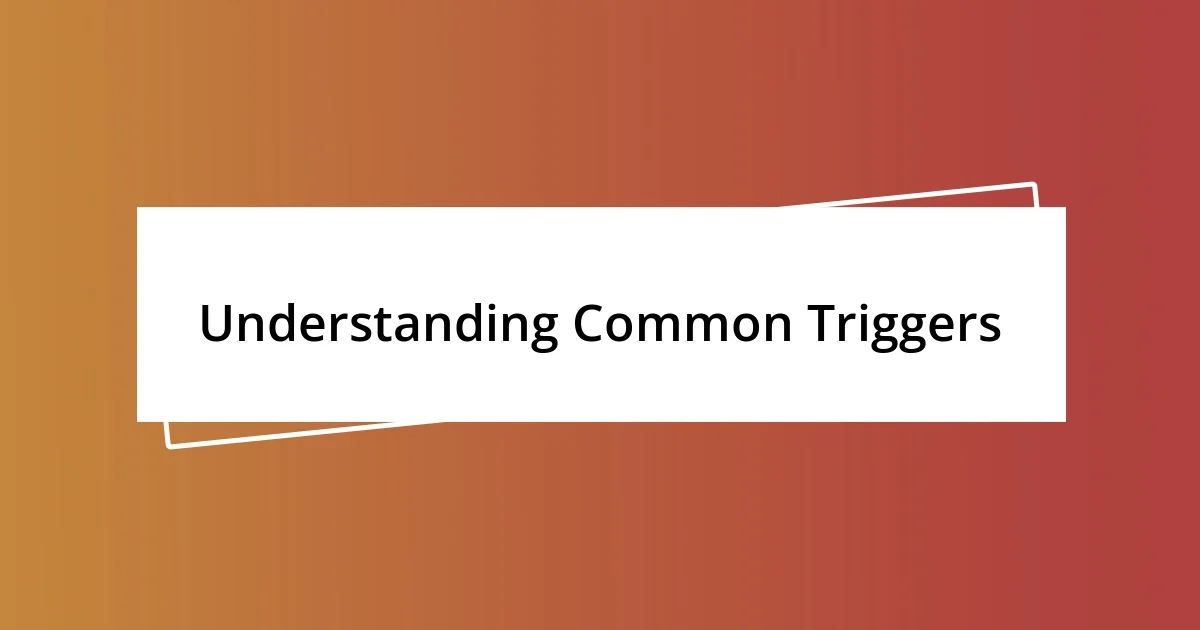
Understanding Common Triggers
Understanding what triggers writer’s block is a distinct journey for each writer. For me, it often shows up unexpectedly—like when I’m just about to dive into a creative project, and suddenly, my mind spirals into a vortex of distractions. I recall a time when a major life event, like moving to a new city, completely disrupted my writing rhythm. It took me a while to realize that the change in my environment was directly affecting my focus.
Common triggers of writer’s block can include:
- Self-Doubt: That nagging feeling that your ideas aren’t good enough.
- Stress: External pressures, like personal or professional life, stealing your creativity.
- Perfectionism: The desire to write something perfect can often lead to paralysis.
- Lack of Motivation: Sometimes, simply not feeling inspired can halt the flow.
- Distractions: Social media and endless notifications can pull you away from your thoughts.
By recognizing these triggers, I’ve learned to navigate through my creative fog. What about you—have you pinpointed what often derails your writing?
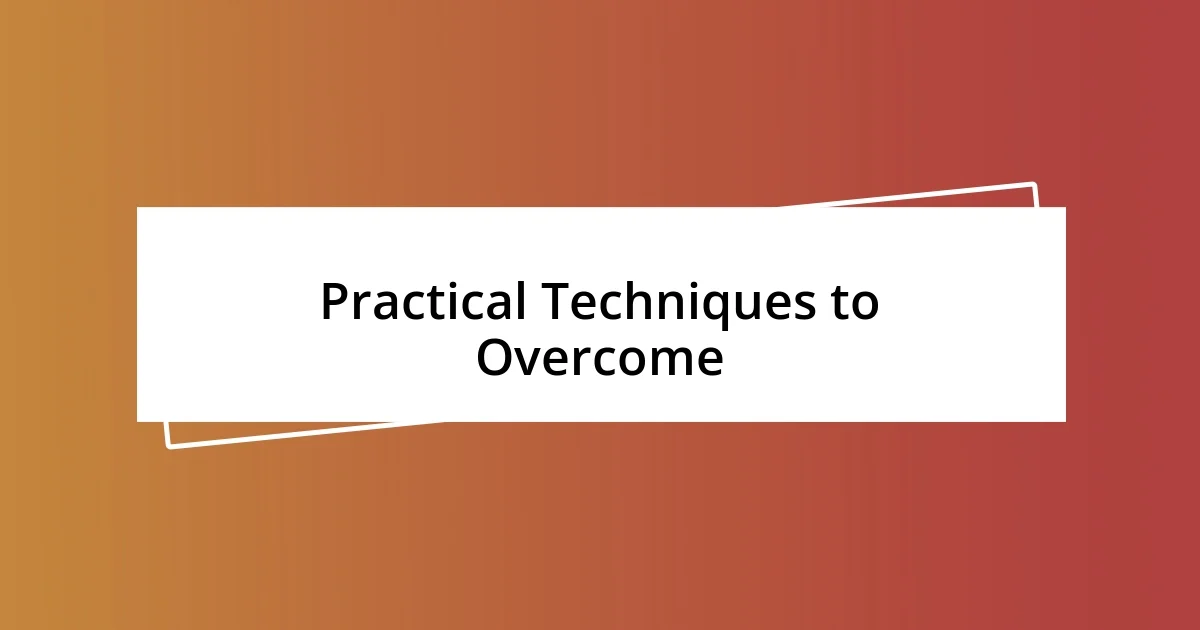
Practical Techniques to Overcome
One practical technique I found helpful was to set a timer for short writing sprints. When I first tried this, I selected 10 minutes, convinced that it would be impossible to produce anything substantial in such a brief window. Surprisingly, I experienced a surge of creativity! In that time, I just wrote freely, letting my thoughts flow without overthinking. Have you ever tried putting a time limit on your writing? It can transform the daunting task into an engaging challenge.
Another powerful method that worked for me was changing my environment. I distinctly recall writing at a café instead of my usual desk. The unfamiliar sounds and sights ignited a burst of inspiration that I hadn’t anticipated. It’s all about finding that spark that awakens your creativity in new surroundings. Have you considered how a change of scenery might refresh your thoughts?
| Technique | Description |
|---|---|
| Timed Writing Sprints | Set a timer and write without stopping for a designated period, like 10 minutes. |
| Changing Your Environment | Relocate to a different place to break the monotony of your usual writing space. |
Finally, I’ve learned that sharing my struggles often lightens the load. Joining a writer’s group or simply confiding in a friend can provide invaluable support. I remember the relief I felt after discussing my creative barriers with fellow writers. Their encouragement and fresh perspectives made all the difference. Have you ever considered reaching out to others when you’re feeling stuck?
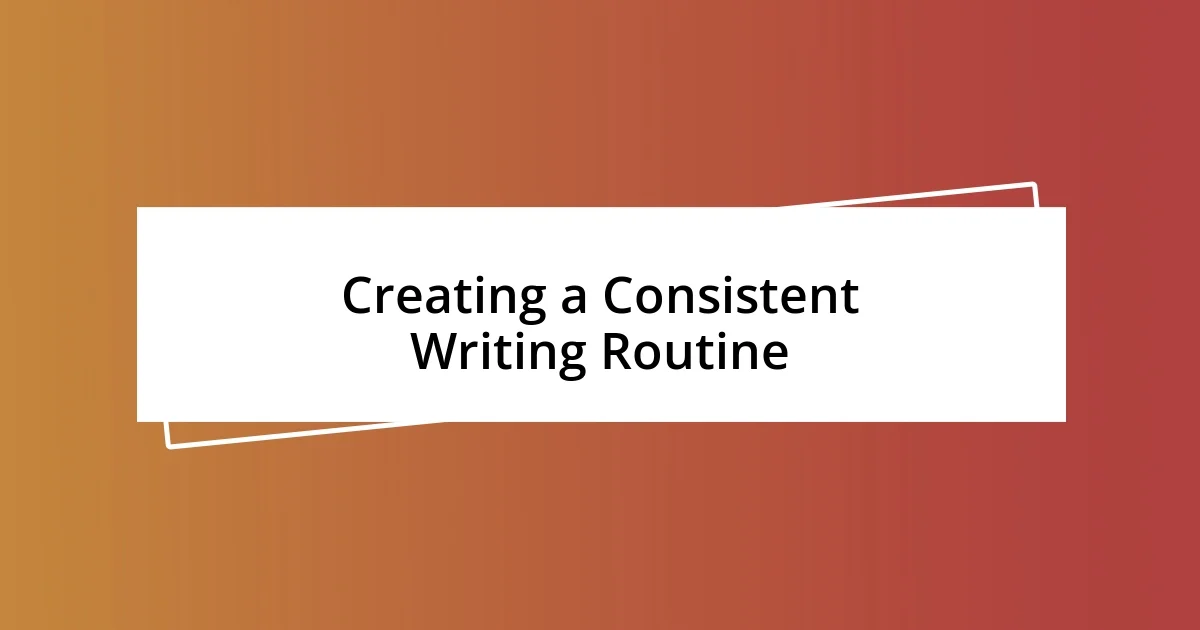
Creating a Consistent Writing Routine
Creating a regular writing routine has been a game changer for me. I discovered that setting a specific time each day really helps reinforce my habit. There’s something comforting about knowing that, for example, every morning at 8 a.m., it’s time to write. Do you have a time carved out for your writing?
At first, establishing a routine felt a bit rigid, but I soon realized it provided a sense of freedom within those boundaries. Once I get into that flow state, ideas seem to rush in, almost as if I’m tapping into a wellspring of creativity. I remember a week where I committed to writing right after breakfast, and those sessions became my most productive. When do you feel most inspired to write?
Another aspect I’ve embraced is flexibility within my routine. While I stick to my morning sessions, I allow myself to adjust as needed. If life gets hectic, I don’t beat myself up for missing a day; instead, I focus on getting back to it when I can. This adaptability has kept me from feeling guilty or trapped. Have you found ways to keep your writing routine flexible?
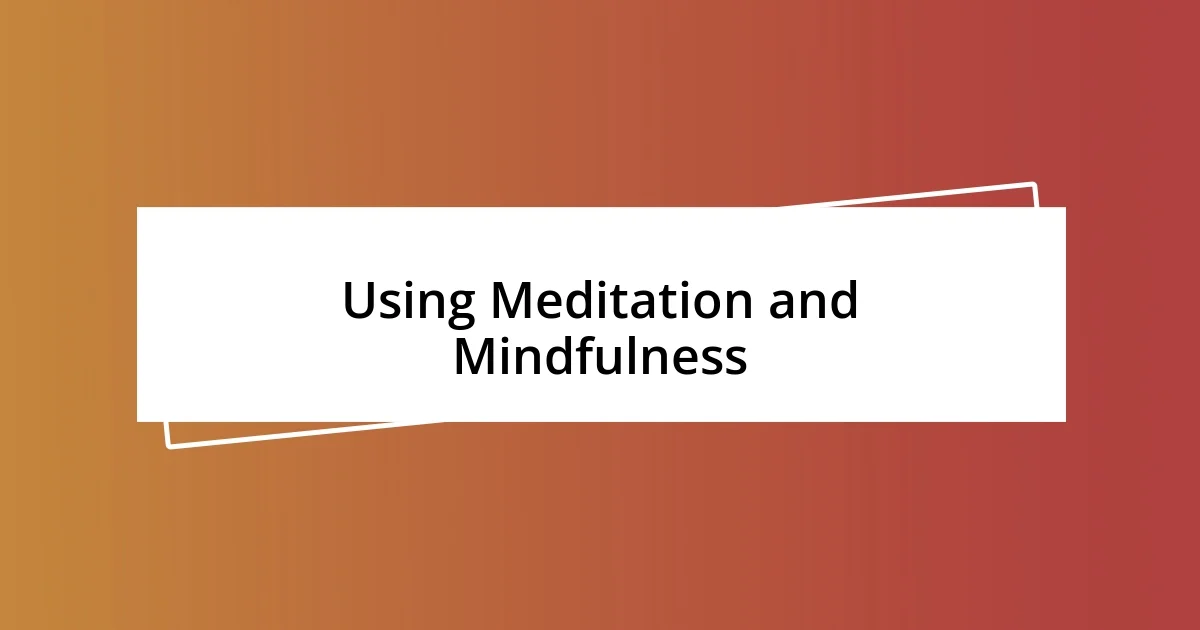
Using Meditation and Mindfulness
Meditation and mindfulness have been surprisingly effective in helping me overcome writer’s block. I recall a particularly frustrating day when the words just wouldn’t come. I took a few moments to sit quietly, focusing on my breath. This simple act of grounding myself opened a space for clarity, allowing ideas to bubble up that I hadn’t thought of. Have you ever tried just sitting still and breathing, letting everything else fade away?
Incorporating mindfulness into my writing routine has been transformative. I often integrate a brief meditation session before I start writing. This practice helps me clear my mind of distractions, creating an oasis of calm that invites creativity. I’ve noticed that returning to this mental space acts as a reset, allowing me to be more present with my thoughts. Has there ever been a time when just a few quiet moments made everything more manageable for you?
Every now and then, I also engage in a mindful walk while thinking about my writing. There’s something about moving through nature that sparks inspiration. I often find that letting my mind wander while focusing on the rhythm of my steps unlocks unexpected ideas. I remember a stroll where I came up with an entire outline for an article just by allowing my thoughts to flow freely. Have you experienced the power of walking in nature to boost your creativity?
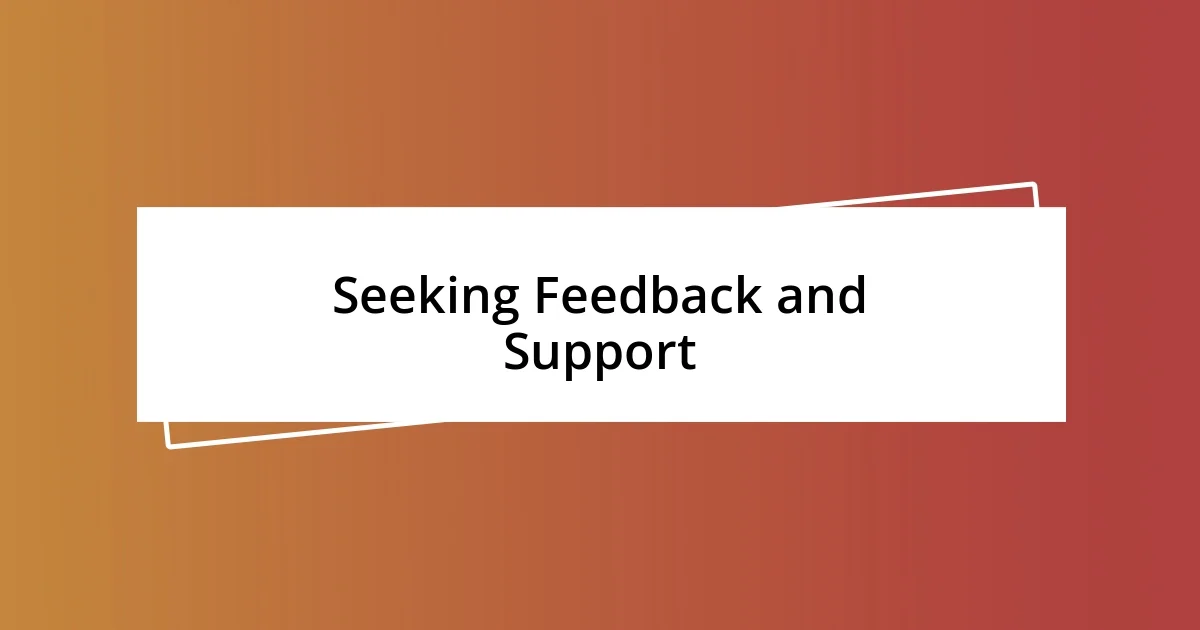
Seeking Feedback and Support
There have been times when seeking feedback from fellow writers or friends has opened my eyes to possibilities I didn’t see. I remember sharing a rough draft of a story with a close friend who pointed out the underlying themes I hadn’t consciously developed. This insight was a revelation; it helped me refine my direction and made the writing process more rewarding. Have you ever received feedback that shifted your perspective entirely?
Taking part in writing groups has also been a tremendous support for me. Everyone shares their struggles, and hearing different experiences reminds me I’m not alone in this journey. I vividly recall attending a workshop where I was feeling particularly stuck. A workshop leader encouraged us to share snippets of our work, and right there, I found new motivation through the diverse perspectives offered. How has your community influenced your writing journey?
Lastly, I discovered that asking for feedback isn’t just about getting critique; it’s also about the encouragement that comes with it. After a recent session where I shared my narrative, the positive vibes uplifted me more than I expected. I felt a wave of excitement for what I was creating, which broke the last barriers of my writer’s block. Can you think of a moment when a little support made all the difference?

Celebrating Small Writing Wins
Recognizing and celebrating small writing wins has been a game-changer for me. I distinctly remember a day when I managed to write just a single paragraph that flowed beautifully. Instead of brushing it off as insignificant, I took a moment to savor that success. Honestly, it felt like a mini victory, reigniting my enthusiasm for writing. Have you ever paused to appreciate a small accomplishment that made a bigger impact on your motivation?
Another time, I set a low bar for myself: 100 words per day. It felt manageable and not daunting at all. Surprisingly, hitting that target was exhilarating. Each day, I’d mark it down, and each tick off that list filled me with a sense of progress and achievement. I often wonder how many writers bypass these small milestones, only to feel demotivated by larger goals. What if we shifted our focus to those little victories instead?
I also keep a dedicated writing journal where I jot down these moments of success—even if it’s just a great sentence or an idea that sparked joy. Flipping through those entries reminds me of my journey and progress, especially during tougher times. It’s a little like celebrating a birthday—each small win deserves recognition! Isn’t it fascinating how acknowledging these moments can elevate our writing experience?












